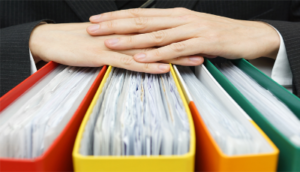Tax Record Retention Guide
| Posted by: mhcpa | No Comments
Tax filing season always leaves behind shoeboxes full of receipts and documents. Tax record retention can be vital in case of an audit. But how long do you need to hold on to your records?
Federal law requires you to maintain copies of your tax returns and supporting documents for three years after the due date of the return or the date the return was filed, whichever is later. The “three-year law” leads people to think they are safe if they retain their documents for this period of time.
However, if the IRS believes that you have significantly underreported your income by 25% or more, or if they believe that there may be an indication of fraud, it may go back six years in an audit. To be safe, follow these tax record retention guidelines for personal documents and tax records:
Documents to keep for up to 1 year:
• Monthly and quarterly statements for brokerage, IRA and mutual fund accounts (once these are reconciled to the annual statements, they can be discarded)
Documents to keep for 3 years:
• Medical bills
• Utility records
• Insurance policies (expired)
• Credit card statements
Documents to keep for 6 years:
• All supporting documents for tax returns, including W-2’s, 1099’s
• Medical bills if deducted on tax return
• Property records, taxes, improvements or until property is sold
• Annual statements for brokerage, IRA and mutual fund accounts
Documents to keep indefinitely:
• Legal records and documents
• Income tax returns (if possible), if not then at least 6 years
• Investment Trade confirmations for buys and sales (keep 6 years beyond selling)
• Insurance policies (keep for life of the policy)
• Mortgages, leases and deeds (keep 6 years beyond the agreement)
• Retirement and pension records
Hopefully, these tax record retention guidelines will help ensure you have the supporting information available should you need it. For those of you that tend to be “packrats”, take this as an opportunity to clean out those unneeded shoeboxes of documents.
Finally, please remember that the disposal of any of these records needs to be done carefully, and not just thrown in the garbage. If personal shredders are not efficient or handy, call a shredding service or ask your legal or tax professionals for help.
Do you have any questions or need help filing your quarterly taxes? Contact us today.
